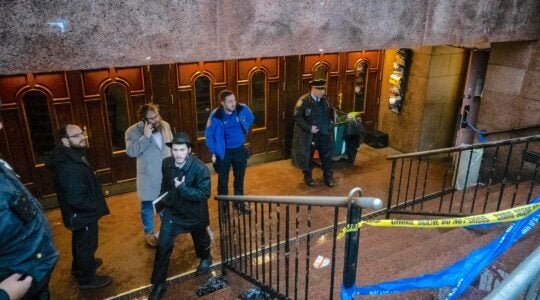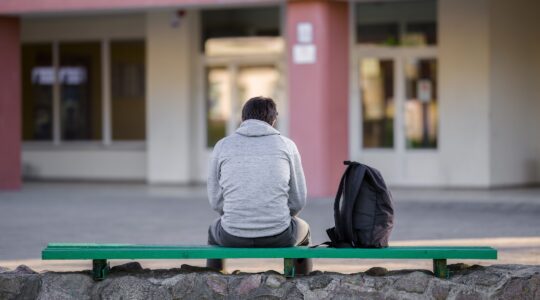The annual March of the Living, a pilgrimage of Jews, mostly students, to the ruins of Auschwitz, is no longer a private affair.Once covered primarily through gentle ìhuman interestî features, and then only in cities with large Jewish populations, the march has become an international story with coverage last week from the Philippines (The Manila Times) to India (The Hindu), let alone across the Western world.But while most of the coverage remains deferential and courteous, the heightened attention has brought with it increased scrutiny, not always complimentary, from the Israeli media and the Israeli and Polish governments.The Chicago Sun-Times (May 5) headlined ìIsrael Downplays Polandís Role in Holocaust,î as the Israeli government acquiesced to the Polish critique that the March of the Living curriculum unduly
conflates the Polish terrain of the camps with the actual German conception and execution.Haaretz (May 4) reported, ìThe Foreign Ministry says that the programsí current format harms Israel-Poland relations and fosters alienation and hostility between Israelis and Poles.îAccording to Haaretz, ìThe Poles say the trips present their country one-dimensionally as a place that was and is still hostile to Jews.î Others complained ìit is insulting that the Israeli groups travel around Poland in isolation, avoiding contact with local youth and leaders.î Israelís Foreign Ministry officials told Haaretz that most of the complaints are justified.Polish Chief Rabbi Michael Schudrich told the press that the tripsí organizers ignore a Polish Jewish community that has come back to life, albeit modestly. Jackie Feldman of Ben-Gurion University, who participated in several of the trips, said the students, by their lack of encounter with modern Polish Jews, are inculcated with the message that Israel is the only safe place, while fostering a sense of threat and hatred toward Poles.To hear the critics, modern Poland is too inconvenient for the March of the Living and its participating politicians. The veteran columnist Nahum Barnea wrote in Yediot Achronot (May 6) that when Prime Minister Ariel Sharon traveled to Poland with last weekís march, he ìlanded there as if he was arriving at a no-manís land, devoid of sovereignty. Indeed, it was as if he landed in some remote spot replete with hostile elements in the West Bank or Lebanon. This is not how one should be conducting oneself in a sovereign country.îBarnea added, ìThe Polish presidentís offer to fly Sharon to meet him was declined,î and Polish Prime Minister Mark Belka said the day before Sharonís arrival that ìhe did not know when and how he would get to meet with Sharon.îìIt wouldnít hurt to find out Poland doesnít only have the crematoria ó it has a government, too,î Barnea said.An editorial in Haaretz (May 5) noted that along with the growth of organized trips for students to Poland has come ìa growth in the critical research about the educational content of the journeys.îEven as the march heavily emphasizes the importance of Israel after the Shoah, the Haaretz editors emphasized the importance for Israel to treat survivors better than theyíve been treated: ìAt least 25 percent of the estimated 250,000 survivors in Israel have difficulty paying for food and medicines.îWhereas the business of the march was seen once as little more than someone making the necessary arrangements, Yediotís editorial (May 5) noted that ìtrips to the extermination camps ó at full charge ó are almost a required subject in the school experience,î and are important aside from the ìless pleasant aspects of the industry that has sprung up around them.îHaaretz (April 29) featured a review of Aharon Appelfeldís book, ìPoland is a Green Country,î in which one character describes Poland as ìa cemetery that has been plowed over. Itís hard to pray in such a place,î a common emotion.But the reviewer, Yossi Avni-Levy, a senior diplomat at the Israeli Embassy in Warsaw, said that although there is still some anti-Semitism, there is nevertheless a ìmoral and intellectual Poland [that] is filled with a touching nostalgia for the vanished Jews. Many young locals are obviously curious about, and even nostalgic for, the rich culture left behind by the Jews and the enormous cities abruptly erased from Polish demographics.îAvni-Levy observed that 67 percent of Bialystok was Jewish ó a higher rate than Jews in Jerusalem.Critics say that march participants are more likely to be drilled about the rise of European anti-Semitism and Israelís isolation in the world than Avni-Levyís observation that ìThe philo-Semitism in Poland is among the most thrilling of its kind in contemporary Europe. Young patrons at Warsawís modern cafes boast of Jewish grandparents, which may be only figments of a wishful imagination. The Jewish festivals held in Krakow and Lodz are bigger than those of Tel Aviv and Haifa.îYes, some Poles were happy to see Jews die, but the reviewer reminds us that ìone-third of the Righteous Among the Nations (non-Jews who saved Jews during the war) are Polish.îTo ignore this ìotherî Poland, both then and now, Avni-Levy wrote, ìis an injustice not only to the Poles, but first of all to ourselves and to the truth.
The New York Jewish Week brings you the stories behind the headlines, keeping you connected to Jewish life in New York. Help sustain the reporting you trust by donating today.




